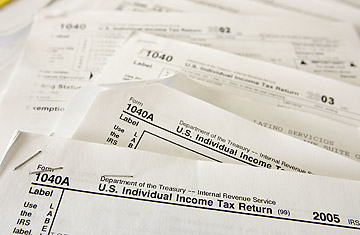
Tax forms from previous years are displayed. Taxpayers are rushing to meet the Tuesday, April 17th deadline for filing their 2006 taxes.
So you might think that the ease with which I was able to do my taxes would imperil the industry of professional tax return preparers — the certified public accountants and H&R Blocks of the world. But you would be wrong. More than 60% of the 136 million people paying taxes this year will pay a real live person to do their returns, according to the IRS. Twenty years ago, before the proliferation of do-it-yourself tax prep software and Web services, that figure was actually lower, around 45%.
It's a rare case of technology not squeezing out the middlemen, and travel agents and stockbrokers are surely jealous. But the explanation is pretty simple: over time, the tax code has grown more and more complex, much too intricate for the average taxpayer to want to wade into. Even the Tax Reform Act of 1986, which simplified the code by taking away many tax preferences, managed to add complexity by limiting certain deductions to people falling into particular income brackets. In 2001 and 2003, just about the time tax prep technology should have been cementing its hold on the mass market, substantial changes — including new rules about dividends and capital gains — kept people moving in the other direction. The Alternative Minimum Tax, a net originally created to catch the super-wealthy trying to shirk taxes, now ensnares some 4 million people a year, many of them solidly middle class. "A lot of those people throw their hands up in the air and say, I don't like doing my taxes once, I'm not going to do them twice," says Tom Ochsenschlager, vice president of taxation for the trade group American Institute of Certified Public Accountants, whose members have been profiting from that sentiment.
Tax software makers — mainly Intuit, which commands 85% of the market, and H&R Block, which holds most of the rest with its TaxCut suite, according to market-tracker NPD Group — certainly bring in a tidy profit. But many of their customers are perpetual do-it-yourselfers like myself, people who have left behind paper and pencil, not a professional tax preparer. I like to think that I'm a numbers person and would do my own taxes no matter what. But the truth of the matter is, I have a relatively simple tax situation, one of the few advantages of not having much money.
Back in the world of bricks and mortar, the likes of H&R Block and Jackson Hewitt, the two largest tax prep outfits, are still able to charge an average of $150 to $200 a pop for doing a return. Pricing at these companies regularly rises 5% to 7% a year, according to Kartik Mehta, an analyst at FTN Midwest Securities — evidence that neither is exactly scrambling to hold on to customers. And the business model works even when the $49.95 price tag for TurboTax Deluxe Deduction Maximizer is taken out of the equation; that is, when the cost of switching is low, or nothing at all. Consider that nearly three-quarters of Jackson Hewitt customers have incomes of $30,000 or less, and that anyone with an adjusted gross income of $52,000 or less can e-file federal taxes at irs.gov for free. Much as the AMT catches the high end of filers, the expansion of the earned income tax credit makes a preparer attractive for folks closer to the bottom of the distribution. Plus, as Eric Toder, a senior fellow at the Urban Institute who has studied the adoption of tax software, says, "You need to own a computer, as well."
Ironically, the group most threatened by technology is the tax prep software industry itself. A new generation of Web-based products, such as TaxAct, are slowly needling their way into the market dominated by Intuit and H&R Block. One reaction of the established players has been to offer services more akin to those of a professional preparer. People who sign up for Intuit's TurboTax Professional Pro supply tax data over the Internet and then have a phone conversation with a preparer, who ultimately does the filing. H&R Block's TaxCut Tango and Signature online products also have live tax advisers just a phone call or e-mail away. And so even the brands dedicated to the do-it-yourselfer have acknowledged that lots of people want a little hand-holding on the way to getting their refund.
